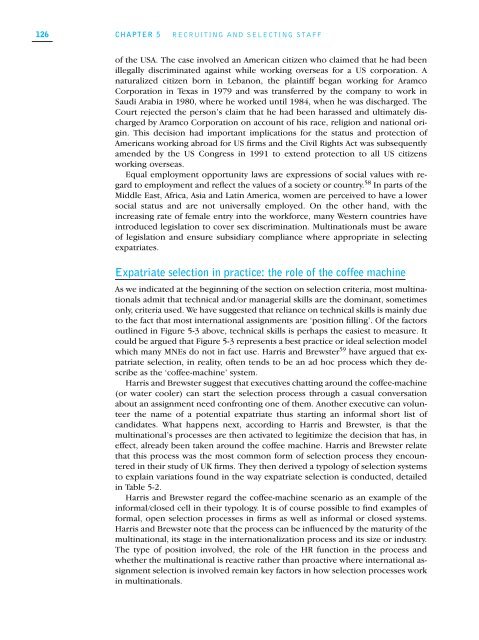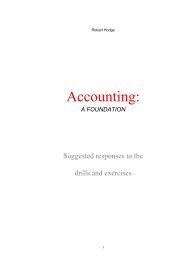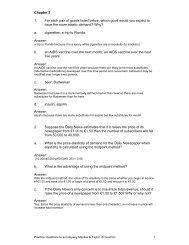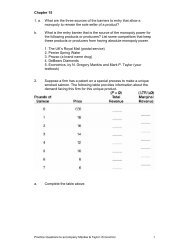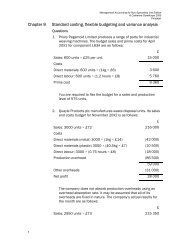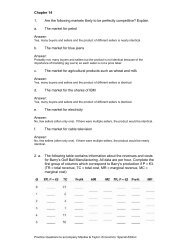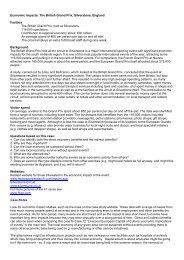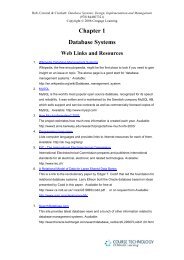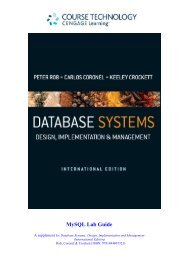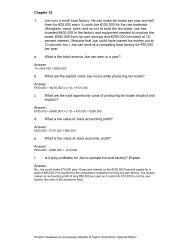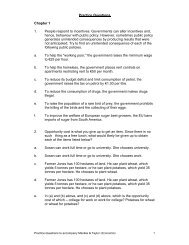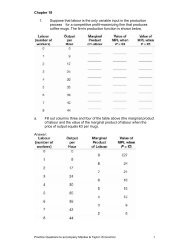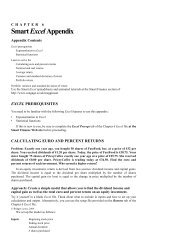CHAPTER Recruiting and selecting staff for international assignments
CHAPTER Recruiting and selecting staff for international assignments
CHAPTER Recruiting and selecting staff for international assignments
- No tags were found...
You also want an ePaper? Increase the reach of your titles
YUMPU automatically turns print PDFs into web optimized ePapers that Google loves.
31017_05_Ch05_p109-136.qxd 9/7/07 12:15 PM Page 126126 <strong>CHAPTER</strong> 5 RECRUITING AND SELECTING STAFFof the USA. The case involved an American citizen who claimed that he had beenillegally discriminated against while working overseas <strong>for</strong> a US corporation. Anaturalized citizen born in Lebanon, the plaintiff began working <strong>for</strong> AramcoCorporation in Texas in 1979 <strong>and</strong> was transferred by the company to work inSaudi Arabia in 1980, where he worked until 1984, when he was discharged. TheCourt rejected the person’s claim that he had been harassed <strong>and</strong> ultimately dischargedby Aramco Corporation on account of his race, religion <strong>and</strong> national origin.This decision had important implications <strong>for</strong> the status <strong>and</strong> protection ofAmericans working abroad <strong>for</strong> US firms <strong>and</strong> the Civil Rights Act was subsequentlyamended by the US Congress in 1991 to extend protection to all US citizensworking overseas.Equal employment opportunity laws are expressions of social values with regardto employment <strong>and</strong> reflect the values of a society or country. 58 In parts of theMiddle East, Africa, Asia <strong>and</strong> Latin America, women are perceived to have a lowersocial status <strong>and</strong> are not universally employed. On the other h<strong>and</strong>, with theincreasing rate of female entry into the work<strong>for</strong>ce, many Western countries haveintroduced legislation to cover sex discrimination. Multinationals must be awareof legislation <strong>and</strong> ensure subsidiary compliance where appropriate in <strong>selecting</strong>expatriates.Expatriate selection in practice: the role of the coffee machineAs we indicated at the beginning of the section on selection criteria, most multinationalsadmit that technical <strong>and</strong>/or managerial skills are the dominant, sometimesonly, criteria used. We have suggested that reliance on technical skills is mainly dueto the fact that most <strong>international</strong> <strong>assignments</strong> are ‘position filling’. Of the factorsoutlined in Figure 5-3 above, technical skills is perhaps the easiest to measure. Itcould be argued that Figure 5-3 represents a best practice or ideal selection modelwhich many MNEs do not in fact use. Harris <strong>and</strong> Brewster 59 have argued that expatriateselection, in reality, often tends to be an ad hoc process which they describeas the ‘coffee-machine’ system.Harris <strong>and</strong> Brewster suggest that executives chatting around the coffee-machine(or water cooler) can start the selection process through a casual conversationabout an assignment need confronting one of them. Another executive can volunteerthe name of a potential expatriate thus starting an in<strong>for</strong>mal short list ofc<strong>and</strong>idates. What happens next, according to Harris <strong>and</strong> Brewster, is that themultinational’s processes are then activated to legitimize the decision that has, ineffect, already been taken around the coffee machine. Harris <strong>and</strong> Brewster relatethat this process was the most common <strong>for</strong>m of selection process they encounteredin their study of UK firms. They then derived a typology of selection systemsto explain variations found in the way expatriate selection is conducted, detailedin Table 5-2.Harris <strong>and</strong> Brewster regard the coffee-machine scenario as an example of thein<strong>for</strong>mal/closed cell in their typology. It is of course possible to find examples of<strong>for</strong>mal, open selection processes in firms as well as in<strong>for</strong>mal or closed systems.Harris <strong>and</strong> Brewster note that the process can be influenced by the maturity of themultinational, its stage in the <strong>international</strong>ization process <strong>and</strong> its size or industry.The type of position involved, the role of the HR function in the process <strong>and</strong>whether the multinational is reactive rather than proactive where <strong>international</strong> <strong>assignments</strong>election is involved remain key factors in how selection processes workin multinationals.


